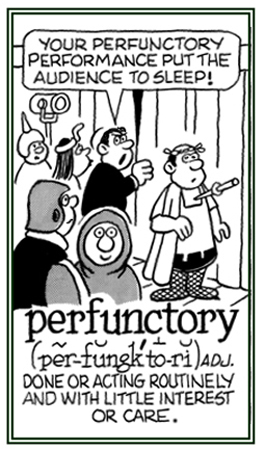per-
(Latin: through, across, over; beyond, by means of)
2. A reference to an activity which is hastily or superficially and mechanically accomplished: When music or dramas are performed merely as routine duties, then they might result in perfunctory renditions.
3. Etymology: from Latin perfunctorius, "done in a careless or superficial manner" from the Latin perfungi, "to accomplish" or "to get through with."


Go to this Word A Day Revisited Index
so you can see more of Mickey Bach's cartoons.
2. Supplying of an organ or tissue with nutrients and oxygen by injecting blood or a suitable fluid into an artery.
3. A chemotherapy technique that may be used when melanoma occurs on an arm or leg.
The flow of blood to and from the limb is stopped for a while with a tourniquet, and anticancer drugs are put directly into the blood of the limb.
This allows the patient to receive a high dose of drugs in the area where the melanoma occurred.
A perfusionist may also be involved in inducing prescribed hypothermia.
2. To make (oneself) guilty of deliberately testifying falsely under oath.
2. A person who intentionally lies while under an oath administered by a notary public, court clerk, or other official, and thus commits the crime of perjury.
A perjurer may commit perjury in oral testimony or by signing, or acknowledging, a written legal document; such as, an affidavit, declaration under penalty of perjury, deed, license application, or tax return, while knowing that the document contains false information.
2. The telling of a lie after having taken an oath to tell the truth, usually in a court of law.
3. Etymology: from 1387, "act of swearing to a statement known to be false", via Anglo-French parjurie (1292) and Old French parjurie, both from Latin perjurium, "false oath", from perjurare, "to swear falsely"; from per-, "away, entirely" + jurare, "to swear". The verb perjure is attested from 1453 (implied in perjured).

Go to this Word A Day Revisited Index
so you can see more of Mickey Bach's cartoons.
2. For a chemical to pass through or to cause to pass through by osmosis or diffusion.
3. To pass through the smallest openings in a porous substance or membrane, or to make something such as a liquid pass through the substance or membrane.
When gas, liquid, or an odor permeates something, it spreads into and through every part of it.
If an attitude or feeling permeates someone, its influence can be clearly felt or seen.


